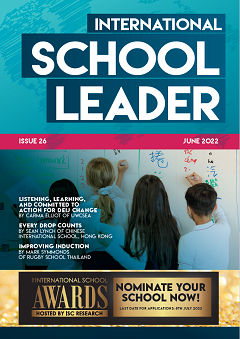In the ever-changing landscape of education, schools must continuously seek innovative ways to empower teachers and enhance student outcomes. At Aoba-Japan International School (A-JIS), the Yearly Teacher Inquiry (YETI) model has emerged as a cornerstone for cultivating reflective practice among educators. Rooted in action research, YETI positions teachers as researchers driving adaptability, critical reflection, and data-informed strategies in their classrooms. By fostering continuous professional growth, YETI not only supports teacher development but also strengthens student engagement and learning outcomes.
Reflective practice for teacher development
At the core of the YETI model is reflective practice—a foundation for effective teaching and ongoing professional development. Inspired by Donald Schön’s “reflective practitioner” framework, YETI integrates structured inquiry cycles that allow teachers to critically evaluate and refine their strategies. This process fosters inclusivity and responsiveness, enabling educators to address the diverse needs of their students.
Reflective practice also aligns seamlessly with A-JIS’s mission of cultivating globally minded learners through collaborative, dynamic environments. By investigating specific classroom challenges, analysing data, and applying evidence-based strategies, YETI encourages teachers to engage in critical thinking and achieve sustainable improvements in their professional skills.
The YETI framework
- Identify a focus area: Teachers select a specific area of teaching, such as student engagement or classroom management.
- Define the problem: A clear, actionable problem is identified to guide the inquiry process.
- Explore root causes: Teachers analyse the factors contributing to the problem, gaining deeper insights.
- Conduct an information review: Educators draw on existing research, peer experiences, and proven practices related to their focus area.
- Formulate a research question: A targeted question ensures the inquiry remains focused and practical.
- Data collection: Teachers gather data from sources such as assessments, observations, and surveys.
- Data analysis: Patterns and insights from the data inform evidence-based decision-making.
- Implement solutions: Teachers apply strategies to address the problem and evaluate their effectiveness in real–time.
- Evaluate the impact: Both qualitative and quantitative data are reviewed to measure success and identify areas for improvement.
- Reflect upon outcomes: Teachers use their findings to refine future practices and sustain improvements.
This structured approach integrates reflective practice into daily routines, fostering a culture of growth and adaptability.
Collaboration and shared learning
Collaboration is a defining element of YETI, emphasising the value of shared learning and peer engagement. Teachers engage in discussions, share strategies, and adapt methods to suit their unique contexts. This collaborative process not only strengthens professional relationships but also promotes innovation and diverse problem-solving approaches.
At A-JIS, YETI is integrated with the Professional Learning Community (PLC) model, enhancing collective efficacy and motivation amongst educators. By fostering a culture of shared learning, YETI encourages teachers to exchange insights, address common challenges, and continuously improve their practice.
Addressing structural challenges
While YETI offers significant benefits, implementing such a model necessitates addressing structural challenges. A-JIS educators identified time constraints as a key obstacle, given the demands of daily teaching responsibilities. To overcome this, the school introduced measures such as allocating dedicated time for inquiry, providing procedural guides, and streamlining data collection through collaborative tools.
Flexible collaboration options also enhanced the model’s adaptability, enabling teachers to engage in team-based or individual inquiries according to their needs. These adjustments ensured that reflective practice remained sustainable and accessible, empowering teachers to fully embrace the YETI process.
Transforming instructional practices
By engaging in action research, YETI enables teachers to refine instructional strategies based on classroom evidence. Educators at A-JIS reported improved responsiveness to diverse learning styles and greater use of differentiated methods, creating more student-centered learning environments.
Research from Pasi Sahlberg supports the effectiveness of reflective, evidence-based approaches in enhancing instructional quality. Unlike traditional professional development, YETI empowers teachers to drive their growth through inquiry-driven, practical methods, leading to stronger engagement and academic outcomes for students.
“Teachers engage in discussions, share strategies, and adapt methods to suit their unique contexts. This collaborative process not only strengthens professional relationships but also promotes innovation and diverse problem-solving approaches.”
Impact on student outcomes
YETI’s benefits extend beyond teacher development to significantly impact student outcomes. Teachers at A-JIS observed notable improvements in student participation, engagement, and critical thinking due to changes informed by their reflective inquiries. Approximately 60% of teachers reported moderate to significant gains in student outcomes, highlighting the model’s effectiveness.
By fostering dynamic, evidence-based instructional methods, YETI not only enhances academic achievement but also nurtures essential skills like creativity and collaboration. These outcomes align closely with A-JIS’s mission of developing globally minded leaders prepared for the complexities of a modern world.
Recommendations for schools
The success of YETI at A-JIS offers valuable insights for other schools aiming to adopt reflective practice models. Key recommendations include:
- Embedding reflective practice: Integrate cycles of inquiry into daily routines to ensure consistency and alignment with teaching schedules.
- Providing structural support: Allocate time and resources for reflection, including tools for data collection and collaboration.
- Promoting collaboration: Foster a culture of shared learning, encouraging teachers to work together and exchange insights.
- Adapting to contexts: Tailor the model to meet specific school goals and logistical needs, offering flexibility for team-based and individual inquiries.
By implementing these strategies, schools can cultivate a culture of reflective practice that drives both teacher development and student success.
By Dr Jake Madden

Dr Jake Madden is the Group Head of Schools at Aoba Education in Tokyo, and a globally recognised educational leader with 40 years of experience in teaching and school leadership. You can connect with him on LinkedIn.



